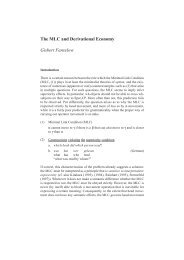Long distance object agreement, restructuring and anti ...
Long distance object agreement, restructuring and anti ...
Long distance object agreement, restructuring and anti ...
Create successful ePaper yourself
Turn your PDF publications into a flip-book with our unique Google optimized e-Paper software.
Bobaljik <strong>and</strong> Wurmbr<strong>and</strong><br />
(13) a. ´ntxa-Bum=nIn k´ma-nk n´nJc& i z´l-es.<br />
forget-1SG.OBJ=3.CL me-DAT fish INTERJ give-INF<br />
‘He forgot to give me (a) fish’ (NSJa. S6:11)<br />
b. ´ntxa-nen k´ma-nk n´nJc& i z´l-es.<br />
forget-3>3SG.OBJ me-DAT fish INTERJ give-INF<br />
‘He forgot to give me (a) fish’ (NSJa. S6:11)<br />
Two important properties hold of LDA in Itelmen in so far as we can tell from the data<br />
available. First, LDA is only possible into a non-finite complement. Second, it is further<br />
restricted to verbs which are cross-linguistically typical members of the class of<br />
<strong>restructuring</strong> predicates, such as modals, aspectual verbs (begin, stop), causatives (which<br />
are affixal) <strong>and</strong> certain lexical verbs such as try, want, <strong>and</strong> forget. The pair in (14)<br />
illustrates this partly; the verb –n(e)txa-‘forget’ may take either a finite or a non-finite<br />
complement, as in English (<strong>and</strong> Russian, the language used for elicitation). In response to<br />
(Russian) prompts with a non-finite complement as in (14)a, examples were given with<br />
LDA; in response to prompts with a finite complement, the matrix verb was given in its<br />
intransitive form, without LDA. 8<br />
(14) a. ‘He forgot to meet me.’<br />
na ´ntxa-Bum=nIn kma jeBna-s<br />
he forget-1SG.OBJ=3.CL me meet-INF (NSJa. S6:8)<br />
b. ‘He forgot that he met me.’<br />
na k-netxa-knen kma k’-jeBna-an<br />
he PRT-forget-INTRANS me PRT-meet-TRANS (NSJa. S6:9)<br />
3.2. Aside: LDA is LDA<br />
Given that Itelmen allows <strong>agreement</strong> with a dative (or other oblique), it is important at<br />
this point to establish that the putative LDA cases do in fact involve <strong>agreement</strong> with an<br />
<strong>object</strong> in the embedded clause, as opposed to being something like the English ‘about’<br />
construction illustrated in (15), where one could imagine that <strong>agreement</strong> is with a<br />
(possibly null) adjunct in the higher clause, coindexed with an element in the lower<br />
clause.<br />
(15) John knew about/of me only that he should meet me at 8:00.<br />
There are three arguments that the Itelmen construction does involve LDA. The first<br />
argument concerns the distribution of oblique <strong>agreement</strong> in Itelmen with intransitive<br />
predicates. While it is possible for an intransitive predicate to agree with an oblique<br />
element (including the possessor of the subject or a silent benefactive) as in (16)a, such<br />
8 Clearly, this argument would be strengthened if we could demonstrate directly that LDA across a<br />
finite clause boundary is strictly impossible, rather than inferring this from the fact that such <strong>agreement</strong> is<br />
unattested in our corpus, while LDA into a non-finite complement is well attested. To establish the stronger<br />
claim will require additional field work.

















